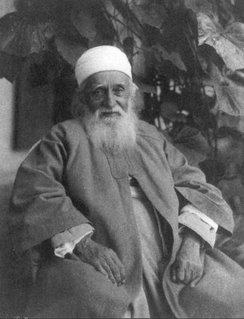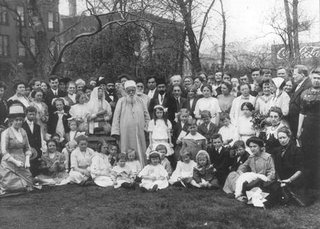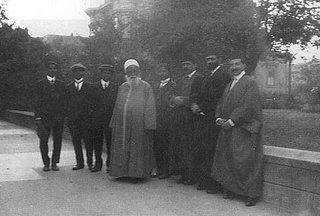ABDUL BAHA ANSWERS QUESTIONS
ASKED BY THEOLOGIANS OF PARIS
Sunday Evening, February 17, 1913 — Pasteur Monnier's Theological Seminary, Paris (The audience was composed of professors, clergy and theological students)
PASTEUR MONNIER: We are very happy to find amongst us one who has come on the part of God and has brought to us a divine message.
ABDUL BAHA: One endowed with the gift of hearing gets the mysteries of God from all things and all creation conveys to him the divine message.
PASTEUR MONNIER: If you will permit us, we want to ask a question: As we are students of theology and are in the rank of the clergy, we would be interested to know your belief about Christ — who he was and what he was.
147
________________________________________
ABDUL BAHA: Our belief in regard to Christ is exactly what is recorded in the New Testament; however, we elucidate this matter and do not speak literally or in a manner based merely on blind belief. For instance, it is recorded in the Gospel of St. John, "In the beginning was the word, the word was with God and the word was God." The majority of Christians accept this matter literally, but we give a logical explanation that no one need find occasion to reject.
The Christians have made this statement about "the word," the foundation of the trinity; but philosophers state that the trinity as regards the identity of divinity is impossible.
We explain this subject as follows: By the "word" we mean that creation with its infinite forms is like unto letters and the individual members of humanity are likewise like unto letters. A letter individually has no meaning, no independent significance, but the station of Christ is the station of the word. That is why we say Christ is the "word" — a complete significance. The universal bestowal of divinity is manifest in Christ. It is obvious that the evolution of other souls is approximate, or only a part of the whole, but the perfections of the Christ are universal, or the whole. The reality of Christ is the collective center of all the independent virtues and infinite significances.
For example, this lamp sheds light and the moon illumines the night with its silvery beams, but neither light is self created.
148
________________________________________
His Holiness the Christ is like unto the sun; his light issued forth from his own identity. He received it not from another person — therefore we give him the comprehensive title of the "word." By this we mean the all-comprehending reality and the depository of the infinite divine characteristics. This "word" has an honorary beginning and not a beginning of time. For instance, we say this person has precedence over all. This precedence comes to him through the station and honor which he now holds in life, but it is not a precedence of time. In reality the "word" has neither beginning nor ending. The letters of the "word" are those qualities which appeared in Christ and not his physical body. These attributes were from God — like unto the rays of the sun reflected in a clear mirror. The rays, the light and the heat of the sun are its qualities which have become manifest in the mirror. It is evident that these qualities were ever with God, even at this time they are with him, they are inseparable from him because divinity is not subject to division. Division is a sign of imperfection and God is the perfect one.
It is clear that the attributes of divinity are co-equal and co-existent with the essence. In that station there is absolute unity. This in brief is the exposition of the station of the Christ.
PASTEUR MONNIER: What is the similarity of the cause of Christ to that of BAHA'O'LLAH, or — what relation do they hold toward each other?
149
________________________________________
ABDUL BAHA: The foundation of the religion of God is one. The same basis which was laid by Christ and later on was forgotten, has been renewed by His Holiness BAHA'O'LLAH. Each divine revelation is divided into two parts. The first part is essential and belongs to the eternal world. It is the exposition of significances and realities. It is the expression of the love of God, the knowledge of God. This is one in all the religions, unchangeable and immutable. The second part is not eternal; it deals with practical life, transactions and business and changes according to the evolution of man and the requirements of the time of each prophet.
These laws are the reflex on this plane of the divine law and symbolize a medium for turning the thoughts of humanity toward justice. The mundane laws change as the horizon of man extends, till it encompass the universe.
For example, during the days of His Holiness Moses, the foundation and the origin of the religion of God spelled morality and that was not changed in the Christian dispensation, but certain differences crept in through the change of the second part of the religion. During the Mosaic period the hand of a person was cut off in punishment of a small theft; there was the law of an eye for an eye and a tooth for a tooth. This was according to the spirit of the age, but as these laws were not expedient in the time of Christ, they were abrogated. Likewise divorce
150
________________________________________
had become so universal that there remained no fixed laws of marriage, therefore His Holiness Christ forbade divorce.
According to the exigencies of the time, His Holiness Moses revealed ten laws for capital punishment. It was impossible at that time to protect the community and preserve social security without these severe measures, for the children of Israel lived in the wilderness of Tah, where there were no established courts of justice and no penitentiaries. But this code of conduct was not needed in the time of Christ. The history of the second part of religion is unimportant, because it belongs to the customs of this life only; but the foundation of the religion of God is one and His Holiness BAHA'O'LLAH has renewed that foundation.
The cause of Christ was wholly spiritual. He changed nothing save the Sabbath day, certain laws of conduct and the law of divorce.
All the precepts of Christ deal with the knowledge of God, with the oneness of the world of humanity, the moral relations between the hearts and spiritual susceptibilities. His Holiness BAHA'O'LLAH created these merciful sentiments in the most complete form and deposited them in the hearts of men. This is in keeping with the teaching of Christ, because it is the reality and reality changes not. Is it possible to say that divine unity is divisible, or the knowledge of God, the oneness of the world of
151
________________________________________
humanity, universal justice, the solidarity of the human race — are they ever subject to transformation?
No, I declare by God they are immutable, for they are the reality.
PASTEUR MONNIER: What is the relationship of Christ and BAHA'O'LLAH with God?
ABDUL BAHA: His Holiness Christ said: "The Father is in me." This we must understand through logical and scientific evidences, for if religious principles do not accord with science and reason, they do not inspire the heart with confidence and assurance.
It is said that once John of Chrysostom was walking along the seashore thinking over the question of the trinity and trying to reconcile it with finite reason; his attention was attracted to a boy sitting on the shore putting water into a cup. Approaching him, he said, "My child, what art thou doing?" "I am trying to put the sea into this cup," was the answer. "How foolish art thou," said John, "in trying to do the impossible." The child replied, "Thy work is stranger than mine, for thou art laboring to bring within the grasp of human intellect the conception of the trinity."
Let us, free from past tradition, investigate the reality of this matter. What is the meaning of the father and the son?
This fatherhood and sonship are allegorical and symbolical. The Messianic reality is like
152
________________________________________
unto a mirror through which the sun of divinity has become resplendent. If this mirror expresses "The light is in me" — it is sincere in its claim; therefore Jesus was truthful when he said, "The Father is in me."
The sun in the sky and the sun in the mirror are one, are they not? — and yet we see there are apparently two suns.
The Jews were expecting the coming of the Messiah, lamenting day and night, saying: "O God, send to us our deliverer!" But as they walked in the path of dogmas, rather than reality, when the Messiah appeared they denied him. Had they been investigators of reality, they would not have crucified — but would have recognized him instantly.
PASTEUR MONNIER: Is the unification of religion possible? If so, when and how and through what channel will it be realized?
ABDUL BAHA: When the devotees of religion cast aside their dogmas and ritualism, the unification of religion will appear on the horizon and the verities of the holy books will become unveiled. In these days superstitions and misunderstandings are rife; when these are relinquished the sun of unity shall dawn.
When in San Francisco I was invited to speak in a Jewish synagogue. I said, "For about two thousand years, between you and the Christians, there has ever existed dark superstitions and misunderstandings which have blinded the eyes.
153
________________________________________
You conceive that His Holiness the Christ was the enemy of Moses, the destroyer of the laws of the Pentateuch, the abrogator of the commandments of the Bible. Investigate and observe that Christ appeared at a time when according to your own historians the laws of the Torah were forgotten; the foundation of religion and faith was shaken. Nebuchadnezzar had come, burning the context of the whole Bible and taking into captivity many Jewish tribes. Alexander the Great came for the second time, and Titus, the Roman general, devastated the land for the third time, killed the Jews, pillaged their property and imprisoned their children.
"At such an hour and under such gloomy clouds, His Holiness the Christ appeared and said, 'The Torah is the divine book; Moses is the man of God; Aaron, Solomon, Isaiah, Zechariah and all the Israelitish prophets are valid and true.' Throughout all regions he spread the Old Testament which for fifteen hundred years had not been sent out of Palestine. Were it not for Christ the name of Moses and his book would not have reached America; for during fifteen hundred years the Torah had been translated but once. It was Christ's seal of approval which caused it to be translated into six hundred languages. Now be just, was Christ the friend or the enemy of Moses?
"You say that he abrogated the Torah, but I say he promulgated the Torah, the ten commandments and all the questions which belong to
154
________________________________________
its moral world. He changed but the following: that the punishment for a small theft should not be to cut off the hand of the offender; if a person blind another, he must not be blinded, or if he break another's teeth, his teeth must not be broken. Is it justice nowadays to establish the archaic laws of an eye for an eye and a tooth for a tooth? Christ changed only that part of the Mosaic religion which did not accord with the spirit of his time. He had no desire to abolish the Torah.
"Is it not true that the Christians believe that Moses was the prophet of God and all the Israelitish seers were the messengers of God and the Bible the book of God? Has this belief of theirs harmed their religion? If you say from your heart that Christ is the word of God, then all these differences will cease. The persecutions of the last two thousand years have been on account of the fact that you were not willing to proclaim these few words. I hope that it is proven to you that Moses had no better friend than His Holiness the Christ."
Today the enmity and rivalry existing between the religions are over mere words. It is an established fact that the followers of all the religions believe in a reality, the benefits of which are universal; which reality is a medium between God and man. The Jews call that reality Moses, the Christians Christ, the Mussulmans Mohammed, the Buddhists Buddha and the Zoroastrians
155
________________________________________
Zoroaster. Now mark well that none of these religionists have ever seen the founders; they have only heard his name. Could they overlook these names they would at once realize that all believe in a perfect reality which is an intermediary between the Almighty and the creatures.
Should you speak to a Jew about the medium or channel between God and man, without referring to any particular name or person, he would say, "Yes, this is right, but I say the name of this mediator is Moses." If you give the exposition of this divine philosophy to the followers of each religion they will agree with you in the abstract, but they will stick to the names of their own prophets and arise in contention and strife over these names. The Jew believes in Christ, though he knows it not, and is quibbling over the mere name.
There have been wars and rumors of war amongst the people of the world for many thousand years; much innocent blood has been shed, many kingdoms and empires have been laid waste. Is it not enough?
Religion should be the means of good fellowship and love. It must upraise the standard of harmony and solidarity. If religion is conducive to hatred and enmity, its existence is harmful to the welfare of the community.
His Holiness the Christ sacrificed his life, not that people might believe the doctrine that he is the word of God; nay, rather, he yearned to
156
________________________________________
bestow the consciousness of continued existence. That is why he said, "Jesus, the son of man, is come to give life to the world."
His aim has been entirely obliterated and the doctrine of the father, son and Holy Spirit has been fabricated. Christ said, "If one strikes you on the right cheek, turn to him the other also." Is there any relation between this commandment and the bloody events of the nations of today?
The religious dissension between the Catholics and Protestants has caused a deluge of bloodshed. Has this any bearing on the statement of Christ when he addressed Peter: "Put thy sword into the scabbard"? When we hold fast to the foundation of religion, differences will disappear.
PASTEUR MONNIER: Is your aim to found a new religion?
ABDUL BAHA: Our aim is to free the foundation of religion from its moss grown dogmas; to dispel the black impenetrable fog of creed so that the regions may be flooded and illumined. May these foul clouds never return; may the rays of the eternal sun encircle all countries, for verily the resplendent sun of reality shines from age to age. (Abdul Baha arose.)
PASTEUR MONNIER: Our hope is likewise the spread of such ideals of unity, peace and concord. We hope to be your co-workers and co-laborers in this field.
ABDUL BAHA: May that unity be established between us that is not ended by separation.
157
________________________________________
(Abdul Baha went into the library where several members of the clergy and professors sought his presence.) One of them said:
"I desire to express the deepest gratitude and pleasure on the part of those present. What you have said is in truth our aim which is the establishment of universal peace and brotherhood."
ABDUL BAHA: Praise be to God that our aims and hopes are one, but we must strive to make this purpose realized.
A PROFESSOR: The International Congress of Religions will be opened in Paris during the month of July. We invite you to take part in the proceedings of that congress.
ABDUL BAHA: It is nearly two years since I left Haifa. I must return. After forty years of confinement and two years of continuous travel my powers are exhausted.
PROFESSOR: The invitation of the congress will be sent to you and we hope you will write a message to be read during the session.
ABDUL BAHA: God willing.
158


















